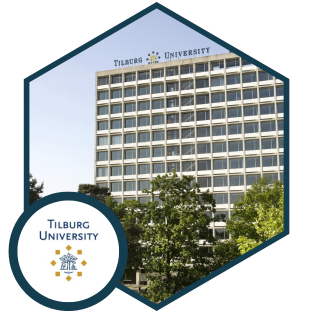The Challenge
A fast growing trend in the Netherlands today is the concept of blended learning; the ability to deliver courses and exceptional learning experiences both online, and in person. The University of Tilburg has been keen to embrace this trend, but the team were finding it difficult to build this hybrid environment in the digital-first post-pandemic education landscape.
While the university had, like many others, primarily operated as an in-person institution prior to the global health crisis, they had been forced to shift to online learning during COVID-19.
As the country eased its restrictions, the university found it challenging to encourage newer students in particular to come back to campus. However, blended learning was an important ambition for the team. Older students who enrolled before the pandemic were keen to return, while newer students who had only ever experienced online learning from the university were unsure.
The team needed a centralised digital learning environment that would help them to create personalised experiences for all learners, and best support every student’s needs.
The Decision
The University of Tilburg had been using their previous learning management system for 20 years and were keen to shift to one that would become the heart of both in-person and digital learning experiences.
It was important that any solution was cloud-based to future-proof the university’s technology stack. It was also important that the new system was able to integrate with existing tools used at the university, such as MS Teams, Google Drive, and other teacher information channels.
During the evaluation process, Canvas continually ranked as the best system against a number of different metrics. It particularly excelled in the usability test, suggesting that both teachers and students would be able to get started with Canvas easily.
Key Findings
The University of Tilburg IT department has noted significantly fewer questions from instructors, suggesting that Canvas is a very intuitive platform to use.
Canvas has enabled the team to move forward with plans to launch more video content, something they say wouldn’t be possible without Canvas.
Using Canvas, individual faculties have been able to use Canvas in their own preferred ways, using methods that align best with the needs of their students.
Canvas has become the University of Tilburg’s ‘heart of the digital working environment’, playing an important role in embracing blended learning.
What I really like about Canvas is that it provides an excellent foundation for adding a range of different external programs. We are introducing a new video platform to help teachers better manage their videos through Canvas, and integrating with numerous other tools which will be hugely advantageous. This is something that had been a struggle with our previous system, but which is very easy with Canvas.
Henri Vermijs, Learning Technologist, University of Tilburg
The Results
Since introducing Canvas, the University of Tilburg team have found that instructors are making more use of different forms of assessment tools, making it easier to track individual progress and learning journeys both online, and in person.
Using a range of formative assessment, classic quizzes, and customised quizzes designed and developed by instructors themselves, the team feels that instructors are gaining more insight into how their students are developing their skills, and how they can adapt their approach to meet online and offline learning needs.
The university has also noted a big change amongst students themselves, who are embracing the LMS more openly given Canvas’ ability to create consistent and familiar experiences, regardless of whether a course is being held online or offline.
Previously, students had found it challenging to navigate between the different course structures.
However, by introducing a template within the system, every course can now be displayed to students in an easy-to-absorb manner.
Download Case Study
